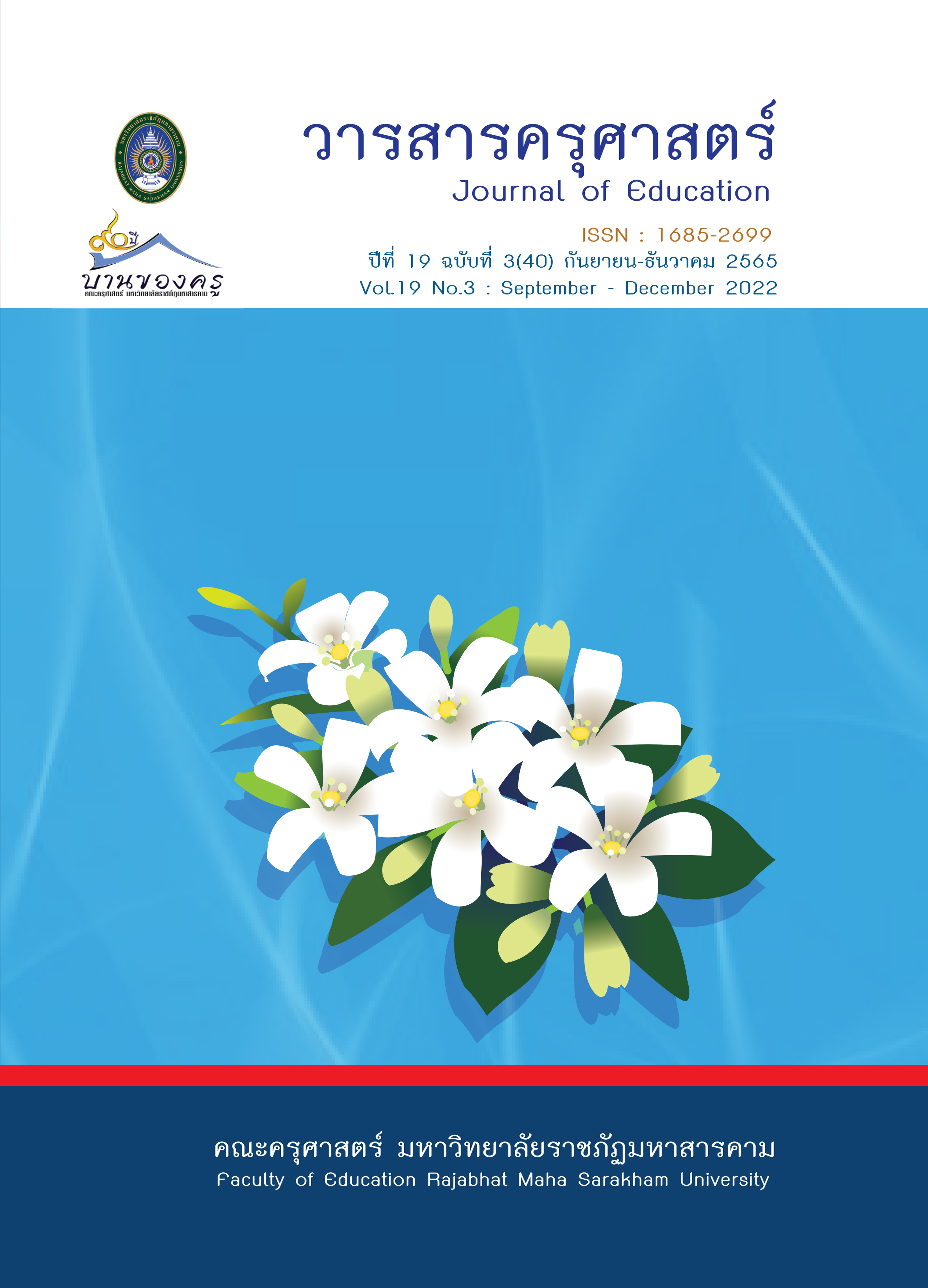แนวทางการพัฒนาพฤติกรรมการเป็นสมาชิกที่ดีขององค์การของครู สำนักงานเขตพื้นที่การศึกษาประถมศึกษาขอนแก่น เขต 5
Main Article Content
บทคัดย่อ
การวิจัยมีวัตถุประสงค์เพื่อ 1) ศึกษาสภาพปัจจุบันและสภาพที่พึงประสงค์ของพฤติกรรมการเป็นสมาชิกที่ดีขององค์การของครูโรงเรียน 2) เสนอแนวทางการพัฒนาพฤติกรรมการเป็นสมาชิกที่ดีขององค์การของครูในโรงเรียน โดยการวิจัยแบ่งออกเป็น 2 ระยะ คือ ระยะที่ 1 ศึกษาระดับสภาพปัจจุบันและสภาพที่พึงประสงค์ของพฤติกรรมการเป็นสมาชิกที่ดีขององค์การของครูโรงเรียน กลุ่มตัวอย่างเป็นผู้อำนวยการโรงเรียนและครูจำนวน 354 คน เครื่องมือในการวิจัย ได้แก่ แบบสอบถามที่มีค่าดัชนีความสอดคล้องอยู่ระหว่าง 0.60-1.00 โดยสภาพปัจจุบัน มีค่าอำนาจจำแนกอยู่ระหว่าง 0.22-0.68 ค่าความเชื่อมั่นเท่ากับ 0.96 และสภาพที่พึงประสงค์ มีค่าอำนาจจำแนกอยู่ระหว่าง 0.88-0.92 ค่าความเชื่อมั่นเท่ากับ 0.91 ระยะที่ 2 ศึกษาแนวทางการพัฒนาพฤติกรรมการเป็นสมาชิกที่ดีขององค์การของครูในโรงเรียน กลุ่มเป้าหมาย ได้แก่ ผู้เชี่ยวชาญ ผู้อำนวยการโรงเรียนและศึกษานิเทศก์ จำนวน 9 คน เครื่องมือในการวิจัย ได้แก่ แบบสัมภาษณ์ ผลการวิจัยพบว่า 1) สภาพปัจจุบันของการสื่อสารเพื่อการโน้มน้าวใจของผู้บริหารสถานศึกษา โดยรวมอยู่ในระดับมาก สภาพที่พึงประสงค์ของการสื่อสารเพื่อการโน้มน้าวใจของผู้บริหารสถานศึกษา โดยรวมอยู่ในระดับมากที่สุด และค่าความต้องการจำเป็นในการพัฒนาการสื่อสารเพื่อการโน้มน้าวใจของผู้บริหารสถานศึกษา อยู่ระหว่าง 0.10-0.35 2) แนวทางการพัฒนาการสื่อสารเพื่อการโน้มน้าวใจของผู้บริหารสถานศึกษา พบว่า ด้านสวัสดิภาพและความวางใจ ได้แนวทางทั้งหมด 5 แนวทาง ด้านสังคมและความคล่องตัว
ได้แนวทางทั้งหมด 5 แนวทาง และด้านคุณสมบัติของผู้บริหาร ได้แนวทางทั้งหมด 4 แนวทาง
Article Details

อนุญาตภายใต้เงื่อนไข Creative Commons Attribution-NonCommercial-NoDerivatives 4.0 International License.
ข้อกำหนดเบื้องต้นที่ผู้นิพนธ์(ผู้ส่งบทความ) ควรทราบ
1. ผู้นิพนธ์ที่ประสงค์จะลงตีพิมพ์บทความกับวารสาร ตั้งแต่เดือนมกราคม 2563 เป็นต้นไป ให้ใช้รูปแบบใหม่ (Template 2563) โดยสามารถดูตัวอย่างได้ที่เมนู GUIDELINES
2. จะตีพิมพ์และเผยแพร่ได้ ต้องผ่านการประเมินจากผู้ทรงคุณวุฒิ (Peer Review)
3. การประเมินบทความโดยผู้ทรงคุณวุฒิ (Peer Review) เป็นแบบ Double Blind
4. การอ้างอิงบทความใช้หลักเกณฑ์ APA (American Psychological Association) คลิก
5. บทความถูกปฏิเสธการตีพิมพ์ ไม่ผ่านการประเมิน ผู้นิพนธ์ขอยกเลิกเองหรือชำระเงินก่อนได้รับการอนุมัติ ทางวารสารไม่มีนโยบายการคืนเงิน
เอกสารอ้างอิง
กัลยารัตน์ ธีระธนชัยกุล. (2557). การบริหารทรัพยากรมนุษย์. ส.เอเชียเพรส (1989).
กษฤณา สุเทพากุล. (2558). พฤติกรรมการเป็นสมาชิกขององค์การของพยาบาลวิชาชีพ โรงพยาบาล.
[วิทยานิพนธ์ปริญญามหาบัณฑิต ไม่ได้ตีพิมพ์]. จุฬาลงกรณ์มหาวิทยาลัย.
เกรียงศักดิ์ เจริญวงศ์ศักดิ์. (2553). แนวโน้มการศึกษาไทยในครึ่งทศวรรษหน้า. www.kriengsak.com.
จินต์จุฑา จันทร์ประสิทธิ์. (2559). การพัฒนาทรัพยากรมนุษย์ของบุคลากรทางการศึกษาสถาบันบัณฑิตพัฒนศิลป์ [สารนิพนธ์ปริญญามหาบัณฑิต]. มหาวิทยาลัยเทคโนโลยีราชมงคลรัตนโกสินทร์.
ชญารัศม์ ทรัพยรัตน์ และประพันธ์ ชัยกิจอุราใจ. (2556). พฤติกรรมการเป็นสมาชิกที่ดีขององค์การ
กับผลลัพธ์ที่เกิดขึ้น Organizational Citizenship Behavior and Its Consequences. สาขาวิชาการจัดการทรัพยากรมนุษย์ มหาวิทยาลัยศรีปทุม.
ณพัชร ประพันธ์พจน์. (2559). การมีส่วนร่วมในกิจกรรมรับผิดชอบต่อสังคมของพนักงานบริษัท ยูนิลีเวอร์ ไทยโฮลดิ้ง จำกัด. สาขาการจัดการภาครัฐและเอกชน มหาวิทยาลัยศิลปากร. วารสารอิเล็กทรอนิกส์ Veridian มหาวิทยาลัยศิลปากร, 9(1), 1-18.
บุญชม ศรีสะอาด. (2560). การวิจัยเบื้องต้น (พิมพ์ครั้งที่ 10). สุวีริยาสาส์นการพิมพ์.
พระมหาตุ๋ย ขนฺติธมฺโม. (2562). บทบาทครูในศตวรรษที่ 21 “ครูผู้สร้างคน”. มหาวิทยาลัยมหาจุฬาลงกรณ์ราชวิทยาลัย วิทยาลัยสงฆ์อุทัยธานี. วารสารภาวนาสารปริทัศน์, 1(3), 1-14.
วิทยาลัยอาชีวะพิษณุโลก. (2557). ผู้บริหารสถานศึกษากับความเป็นมืออาชีพ. วิทยาลัยอาชีวะพิษณุโลก.
สุวิมล ว่องวาณิช. (2558). การวิจัยประเมินความต้องการจำเป็น. จุฬาลงกรณ์มหาวิทยาลัย.
สายฝน กล้าเดินดง. (2552). การจัดการความรู้กับความพร้อมในการพัฒนาไปสู่องค์การแห่งการ
เรียนรู้ของบุคลากร เจเนอเรชั่นวาย ในเขตกรุงเทพมหานคร [วิทยานิพนธ์ปริญญามหาบัณฑิต ไม่ได้ตีพิมพ์].มหาวิทยาลัยศรีปทุม.
สำนักงานเลขาธิการคุรุสภา. (2560). ข้อบังคับคุรุสภา ว่าด้วยจรรยาบรรณของวิชาชีพ พ.ศ. 2556. สำนักงานเลขาธิการคุรุสภา.
สำนักงานเขตพื้นที่การศึกษาประถมศึกษาขอนแก่น เขต 5. (2652). แผนปฏิบัติการประจำปีงบประมาณ 2562. กลุ่มนโยบายและแผน สำนักงานเขตพื้นที่การศึกษาประถมศึกษาขอนแก่น เขต 5.
อรัญ ซุยกระเดื่อง. (2557). การวิจัยทางการศึกษาพื้นฐาน. มหาวิทยาลัยราชภัฏมหาสารคาม.
Podsakoff, P. M., Ahearne, M., & MacKenzie, S. B. (1997). Organizational citizenship behavior and the quantity
and quality of work group performance. Journal of applied psychology, 82(2), 262.


